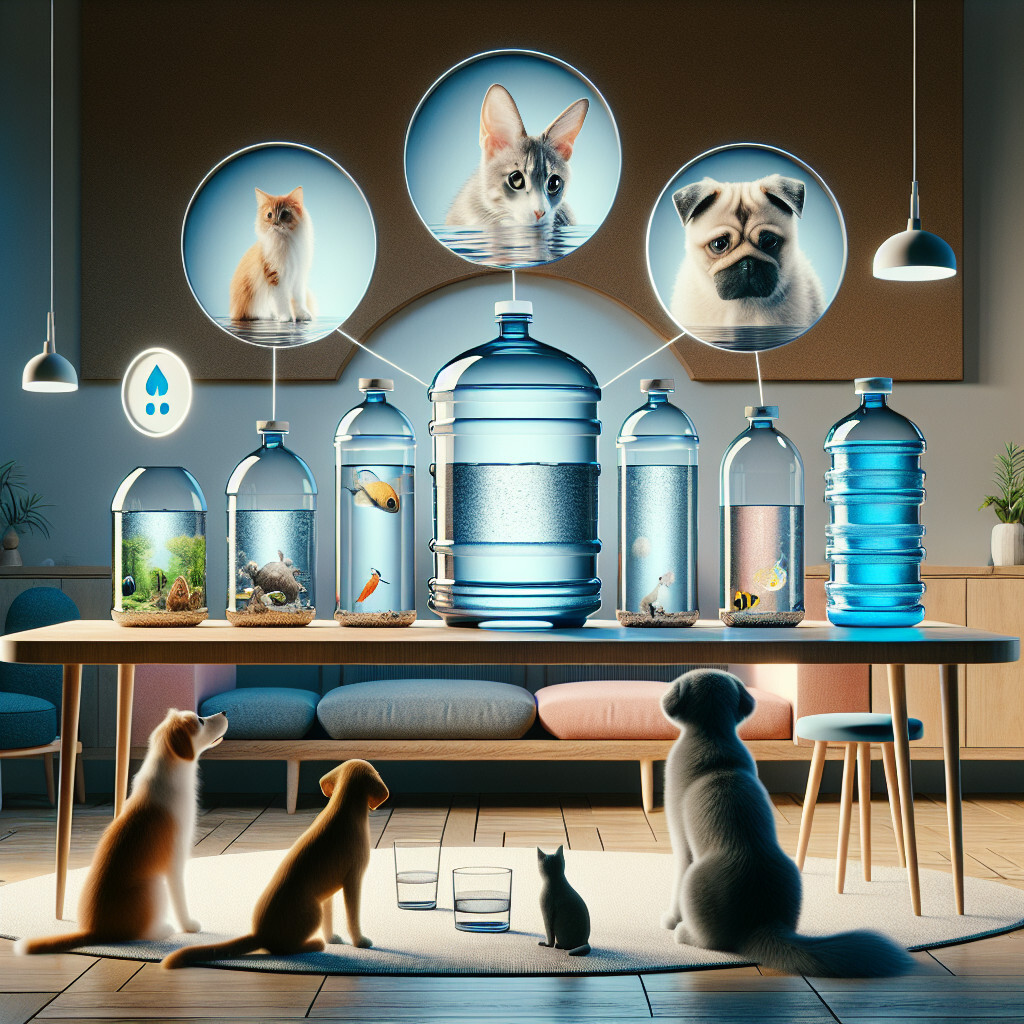-
Table of Contents
“Pure, clean, and fresh – the best hydration for your pet’s health and happiness.”
Introduction

The best kind of water for pets is clean, fresh, and filtered water. It should be free from any harmful chemicals, toxins, or contaminants that could potentially harm the pet’s health. It’s also important that the water is changed daily to ensure its freshness and prevent the growth of bacteria. Some pet owners may choose to give their pets bottled or filtered water, as tap water can sometimes contain fluoride or chlorine, which may not be suitable for all pets. However, the specific type of water can depend on the pet’s species, age, and overall health condition.
Understanding the Importance of Filtered Water for Pets
Water is a fundamental necessity for all living beings, including our beloved pets. It plays a crucial role in maintaining their overall health and well-being. However, the type of water we provide to our pets is a topic that often goes overlooked. Many pet owners may not realize that the quality of water they offer their pets can significantly impact their health. This article aims to shed light on the importance of filtered water for pets and why it is considered the best option.
The quality of tap water can vary greatly depending on the location and the source. While it is generally safe for human consumption due to rigorous treatment processes, it may still contain certain elements that could be harmful to pets. For instance, tap water often contains chlorine, a chemical used to kill bacteria and other microbes. While this substance is not harmful to humans in small amounts, it can cause adverse reactions in pets, such as skin irritations and digestive issues. Moreover, tap water may also contain traces of heavy metals, such as lead and mercury, which can be toxic to pets.
Bottled water, on the other hand, is often seen as a safer alternative due to its perceived purity. However, it’s important to note that not all bottled water is created equal. Some brands may contain high levels of sodium, which can be harmful to pets, especially those with heart or kidney conditions. Additionally, the plastic bottles themselves can leach chemicals into the water over time, posing another potential health risk.
This brings us to filtered water, which is increasingly being recognized as the best type of water for pets. Filtered water undergoes a process that removes impurities, such as chemicals, bacteria, and heavy metals, without stripping away beneficial minerals. This results in clean, safe water that is free from potentially harmful substances.
One of the main advantages of filtered water is that it can help prevent health issues in pets. By removing harmful substances, filtered water reduces the risk of pets developing conditions related to poor water quality, such as urinary tract infections and kidney diseases. Moreover, filtered water often tastes better than tap water, which can encourage pets to drink more and stay hydrated.
Investing in a good quality water filter for your pets can be a wise decision. There are various types of filters available on the market, including activated carbon filters, reverse osmosis systems, and distillers. Each type has its own advantages and disadvantages, so it’s important to do your research and choose the one that best suits your pet’s needs.
In conclusion, while tap water and bottled water may be convenient options, they may not always be the safest choices for our pets. Filtered water, on the other hand, offers a clean, safe, and tasty hydration solution for our furry friends. By providing filtered water, pet owners can ensure that their pets are getting the hydration they need without the risk of exposure to potentially harmful substances. After all, our pets are part of our family, and they deserve the best care we can provide.
The Benefits of Spring Water for Your Pet’s Health
Water is an essential component of life, and just as it is crucial for humans, it is equally important for our pets. The type of water we provide to our pets can significantly impact their health and wellbeing. While tap water is the most common choice for many pet owners, spring water is increasingly being recognized for its potential benefits to pet health.
Spring water originates from a natural source and undergoes minimal treatment before it reaches the consumer. This means it retains many of its natural minerals, such as calcium, magnesium, and potassium, which are beneficial for your pet’s health. These minerals are essential for various bodily functions, including bone development, nerve function, and maintaining a healthy heart. Therefore, providing your pet with spring water can contribute to their overall health and vitality.
Moreover, spring water is typically free from harmful chemicals and contaminants often found in tap water. Tap water can contain chlorine, fluoride, and other chemicals used in water treatment processes. While these substances are generally safe for human consumption in small amounts, they can be harmful to pets, particularly smaller animals with lower body weights. Long-term exposure to these chemicals can lead to health issues such as digestive problems, skin conditions, and even certain types of cancer. By choosing spring water, you can reduce your pet’s exposure to these potential hazards.
Another advantage of spring water is its taste. Many pets, particularly cats, are notoriously fussy drinkers. The natural, clean taste of spring water can be more appealing to pets than the taste of chemically treated tap water, encouraging them to drink more. Adequate hydration is crucial for pets, aiding digestion, nutrient absorption, and maintaining healthy skin and coat. Therefore, if your pet enjoys the taste of their water, they are more likely to drink the necessary amount, promoting their overall health.
However, it’s important to note that not all spring water is created equal. Some brands may source their water from less pristine environments, or they may add minerals and other substances during bottling. Therefore, it’s crucial to research and choose a reputable brand that maintains high standards for their water quality.
Additionally, while spring water can offer numerous benefits, it should not replace a balanced diet and regular veterinary care. Pets require a range of nutrients, many of which they obtain from their food. Regular check-ups with a vet are also essential to monitor your pet’s health and detect any potential issues early.
In conclusion, spring water can be a beneficial addition to your pet’s diet. Its natural mineral content, lack of harmful chemicals, and appealing taste can contribute to your pet’s health and wellbeing. However, it’s essential to choose high-quality spring water and remember that it is just one aspect of maintaining your pet’s health. A balanced diet, regular exercise, and veterinary care are also crucial for your pet’s longevity and quality of life.
Tap Water vs. Bottled Water: Which is Better for Your Pets?
Water is a fundamental necessity for all living beings, including our beloved pets. The quality of water we provide to our pets can significantly impact their health and well-being. The ongoing debate between tap water and bottled water for pets is a topic of interest for many pet owners. This article aims to shed light on this subject, providing insights to help pet owners make an informed decision.
Tap water is the most common type of water provided to pets. It is readily available, cost-effective, and generally safe for consumption. Most municipal water supplies in developed countries are treated and regulated to remove harmful bacteria and contaminants. However, the quality of tap water can vary greatly depending on the location. In some areas, tap water may contain high levels of minerals like iron and magnesium, which can lead to health issues in pets if consumed in large quantities over time. Additionally, tap water may also contain traces of chlorine, fluoride, and other chemicals used in water treatment processes. While these are typically present at safe levels for human consumption, their effects on pets, particularly small ones, are not entirely known.
On the other hand, bottled water is often perceived as a safer and healthier alternative. It undergoes rigorous purification processes, such as distillation, reverse osmosis, or ultraviolet sterilization, to remove impurities and contaminants. Some pet owners prefer bottled water because it is free from the chemicals used in tap water treatment. However, it’s important to note that not all bottled water is created equal. Some brands may still contain minerals or other additives. Moreover, bottled water is significantly more expensive than tap water and contributes to plastic waste, posing environmental concerns.
So, which type of water is best for your pets? The answer largely depends on the quality of your local tap water and the specific needs of your pet. If your tap water is of high quality and meets the safety standards, it should be perfectly fine for your pets. However, if you have concerns about the quality of your tap water, or if your pet has specific health issues that could be affected by certain minerals or chemicals in tap water, bottled water may be a better option.
It’s also worth considering filtered water as a middle ground. Water filters can remove many of the potential contaminants found in tap water, providing a safe and cost-effective alternative to bottled water.
Regardless of the type of water you choose, it’s crucial to ensure your pets always have access to fresh, clean water. Regularly clean their water bowls to prevent the growth of bacteria and replace the water at least once a day.
In conclusion, both tap water and bottled water have their pros and cons when it comes to pet hydration. The best choice depends on various factors, including the quality of your local water supply and your pet’s health. If in doubt, consult with a veterinarian to make the best decision for your furry friend. Remember, providing clean, fresh water is one of the most important things you can do to keep your pets healthy and happy.
Debunking Myths: Is Distilled Water Safe for Pets?
Water is a fundamental necessity for all living beings, including our beloved pets. However, the type of water we provide to our pets has become a topic of debate among pet owners. One of the most controversial discussions revolves around the use of distilled water. Is it safe for pets? To answer this question, it is essential to debunk some myths and misconceptions surrounding this topic.
Distilled water is water that has undergone a purification process to remove impurities and minerals. This process involves boiling the water and then condensing the steam back into a liquid form. The result is water that is free from contaminants, bacteria, and minerals. At first glance, this might seem like the ideal choice for pets. However, the absence of minerals in distilled water has raised concerns among pet owners and veterinarians.
One common myth is that distilled water is harmful to pets because it lacks essential minerals. It’s true that distilled water doesn’t contain minerals like calcium and magnesium, which are necessary for the proper functioning of the body. However, it’s important to note that pets, like humans, get most of their essential minerals from food, not water. Therefore, as long as your pet is on a balanced diet, the lack of minerals in distilled water should not pose a problem.
Another myth is that distilled water can lead to mineral deficiencies in pets. This misconception stems from the theory that distilled water, being devoid of minerals, can leach minerals from the body, leading to deficiencies. However, this theory has been largely debunked by scientific research. Studies have shown that the body’s mineral content is primarily regulated by dietary intake and not by the type of water consumed. Therefore, providing your pet with a balanced diet rich in essential minerals should prevent any potential deficiencies.
Despite these myths, it’s important to remember that distilled water is not harmful to pets. In fact, it can be beneficial in certain situations. For instance, if your pet has a urinary tract condition, distilled water can help reduce the mineral content in their urine, which can help prevent the formation of urinary stones. Additionally, if your local tap water is contaminated or hard, distilled water can be a safer alternative.
However, it’s also worth noting that distilled water is not necessarily the best choice for all pets. Some pets may not like the taste of distilled water, as it lacks the natural flavors that come from minerals. Moreover, distilled water can be more expensive and less environmentally friendly than tap water, due to the energy required for distillation and the plastic waste from bottled water.
In conclusion, distilled water is safe for pets, but it’s not necessarily the best choice for all pets. The best type of water for your pet depends on various factors, including their health, taste preferences, and your local water quality. As a pet owner, it’s important to make an informed decision based on accurate information and consultation with a veterinarian. Remember, providing clean, fresh water is just one aspect of ensuring your pet’s overall health and well-being.
Q&A
1. Question: What kind of water is best for pets?
Answer: Fresh, clean, and filtered water is best for pets.
2. Question: Can pets drink tap water?
Answer: Yes, pets can drink tap water, but it’s safer if it’s filtered to remove any potential contaminants.
3. Question: Is bottled water safe for pets?
Answer: Yes, bottled water is safe for pets, but it’s not environmentally friendly and can be expensive.
4. Question: Can pets drink distilled water?
Answer: Yes, pets can drink distilled water, but it lacks the minerals found in regular water that are beneficial for their health.
Conclusion
After considering various factors such as safety, cleanliness, and mineral content, it can be concluded that filtered tap water is the best type of water for pets. It is free from harmful chemicals and potential pathogens that could be present in unfiltered tap water or certain types of bottled water.






